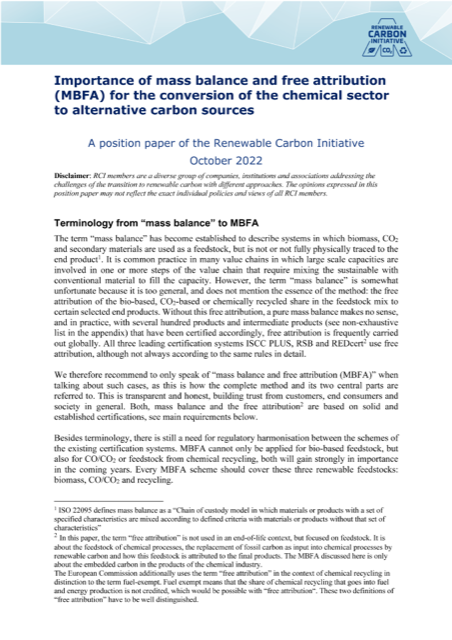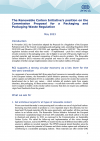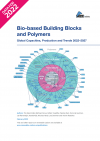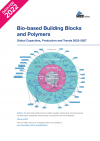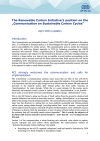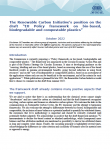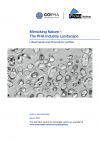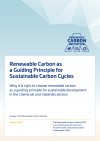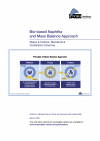Importance of mass balance and free attribution (MBFA) for the conversion of the chemical sector to alternative carbon sources (October 2022)
FREE
A position paper of the Renewable Carbon Initiative
This position paper highlights the importance of mass balance and free attribution “MBFA” as one possible way to incentivise the transformation of the chemical sector away from fossil and on towards renewable carbon.
The term “mass balance” has become established to describe systems in which biomass, CO2 and secondary materials are used as a feedstock, but is not or not fully physically traced to the end product . It is common practice in many value chains in which large scale capacities are involved in one or more steps of the value chain that require mixing the sustainable with conventional material to fill the capacity. The approach makes it possible to substitute large quantities of fossil raw materials and attractive renewable content shares can be attributed to desired materials or products for which demand on the market exists. This incentivises a stepwise continuous transformation to increase the share of renewable carbon in particular for the large-scale chemical industry
However, the term “mass balance” is somewhat unfortunate because it is too general, and does not mention the essence of the method: the free attribution of the bio-based, CO2-based or chemically recycled share in the feedstock mix to certain selected end products.
The RCI recommends to only speak of “mass balance and free attribution (MBFA)” when talking about such cases, as this is how the complete method and its two central parts are referred to. This is transparent and honest, building trust from customers, end consumers and society in general. Both, mass balance and the free attribution are based on solid and established certifications.
Besides terminology, there is still a need for regulatory harmonisation between the schemes of the existing certification systems. MBFA cannot only be applied for bio-based feedstock, but also for CO/CO2 or feedstock from chemical recycling, both will gain strongly in importance in the coming years. Every MBFA scheme should cover these three renewable feedstocks: biomass, CO/CO2 and recycling.
-
RCI’s position paper: “Commission proposal for a Packaging and Packaging Waste Regulation” (May 2023)
Policy
3 Pages
295 Downloads
295 Downloads
2023-05
FREE
295
Downloads -
Bio-based Building Blocks and Polymers – Global Capacities, Production and Trends 2022-2027 (PDF)
Markets & Economy
387 Pages

2023-02
500 € – 1,000 €Price range: 500 € through 1,000 € ex. tax
Plus 19% MwSt. -
Bio-based Building Blocks and Polymers – Global Capacities, Production and Trends 2022-2027 – Short Version (PDF)
Markets & Economy
28 Pages
1964 Downloads
1964 Downloads
2023-02
FREE
1964
Downloads -
RCI’s position paper: “Communication on sustainable carbon cycles” (April 2023)
Policy
7 Pages
561 Downloads
561 Downloads
2023-04
FREE
Free Shipping561
Downloads -
RCI’s position paper: “Draft EU policy framework on bio-based, biodegradable and compostable plastics” (October 2022)
Policy, Sustainability & Health
5 Pages
538 Downloads
538 Downloads
2022-10
FREE
Free Shipping538
Downloads -
Mimicking Nature The PHA Industry Landscape Latest trends and 28 producer profiles
Markets & Economy
59 Pages

-
RCI’s scientific background report: “Renewable carbon as a guiding principle for sustainable carbon cycles” (February 2022)
Policy, Sustainability & Health
41 Pages
2974 Downloads
2974 Downloads
2022-02
FREE
2974
Downloads -
Bio-based Naphtha and Mass Balance Approach – Status & Outlook, Standards & Certification Schemes
Markets & Economy
48 Pages

2021-03
850 € – 3,500 €Price range: 850 € through 3,500 € ex. tax
Plus 19% MwSt.Free Shipping

